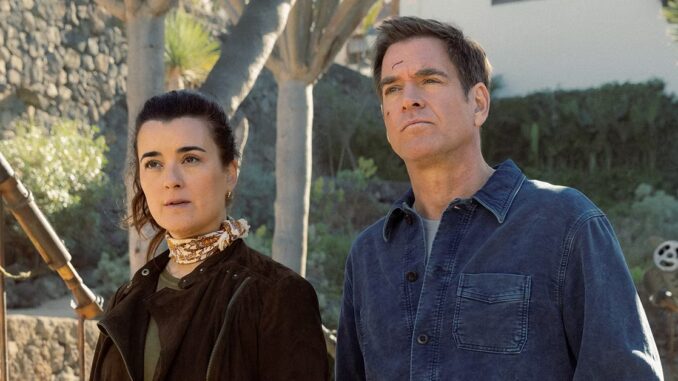
When NCIS first premiered on CBS in 2003, no one — not even its cast — could have predicted the cultural phenomenon it would become. Back then, it was a modest procedural trying to find its footing in a crowded TV landscape dominated by CSI, Law & Order, and ER. Its tone was uncertain, its audience small, and its future far from guaranteed.
But according to NCIS original star Michael Weatherly, the series didn’t survive because it was perfect — it survived because it was just good enough.
“We weren’t good enough to get all the attention,” Weatherly told The Seattle Times in a newly resurfaced interview. “And we weren’t bad enough to get canceled. We were just… there, keeping it afloat until everyone realized how much potential it really had.”
Those early seasons of NCIS — particularly the first two — were a strange mix of procedural grit and quirky humor. Viewers met a cast of characters who didn’t quite fit together at first: the stern team leader Leroy Jethro Gibbs (Mark Harmon), the charmingly arrogant Tony DiNozzo (Weatherly), the genius goth Abby Sciuto (Pauley Perrette), and the stoic medical examiner “Ducky” Mallard (David McCallum).
The formula wasn’t fully formed yet — but the chemistry was undeniable.
🔥 From “Almost Canceled” to Cult Sensation
Weatherly admitted that there was an awkward grace period before NCIS hit its stride. “We were learning who we were,” he said. “The show wasn’t flashy. It wasn’t trying to reinvent television. But somewhere around Season 3, people started to feel something — a sense of comfort, of camaraderie, of a family that wasn’t perfect but always got the job done.”
That was also the season where Cote de Pablo joined the cast as Ziva David, the mysterious Israeli Mossad agent who became one of the show’s most beloved characters. De Pablo herself recently said on the Off Duty: An NCIS Rewatch podcast that Season 3 remains her favorite — and it’s not hard to see why.
It was the year NCIS went from being a procedural to a phenomenon.
⚓ “The Good Guys Still Win” — Why NCIS Endures
While some TV dramas aim to challenge morality or dwell in gray areas, NCIS found power in reassurance. Actor Rocky Carroll, who joined in Season 5 as Director Leon Vance, believes that this sense of reliability is exactly what kept the series afloat.
“As complicated as the world gets, there’s something comforting about turning on your TV and knowing that the good guys are going to win,” Carroll said in an interview with CBR. “It gives people hope. That’s why NCIS isn’t just a show — it’s a ritual.”
That formula — comfort, consistency, and a cast of characters fans grew to love — became the franchise’s secret weapon. It not only stabilized NCIS through rough ratings patches but also helped spawn an empire.
🌎 The Rise of the NCIS Universe
Since its rocky start, NCIS has expanded into one of the most successful franchises in television history. The first spin-off, NCIS: Los Angeles, premiered in 2009 and ran an incredible 14 seasons, powered by Chris O’Donnell, LL Cool J, and Daniela Ruah. Then came NCIS: New Orleans, NCIS: Hawai’i, and most recently NCIS: Sydney — the first international installment, which returns for its second season on January 31.
Even two decades later, fan passion hasn’t cooled. But as new iterations rise, so do debates. “I like NCIS: Sydney, but I would rather have kept New Orleans or Los Angeles,” one fan wrote online. Another added, “What about #NCISHawaii? We need a Season 4 renewal now!”
Love it or hate it, NCIS continues to spark conversation — proof that it’s still very much alive in the cultural bloodstream.
🎬 The Legacy of Weatherly’s Wisdom
Michael Weatherly’s self-deprecating humor might sound casual, but his insight captures what few franchises ever achieve: longevity born from authenticity.
“We believed in it,” he said simply. “Even when nobody else did.”
Now, with over 22 seasons, more than 450 episodes, and multiple spin-offs under its belt, NCIS isn’t just surviving — it’s thriving.
What started as a “not bad enough to cancel” series has become a defining chapter in TV history, proving that sometimes, greatness isn’t about perfection. It’s about persistence, passion, and the people who keep showing up.

